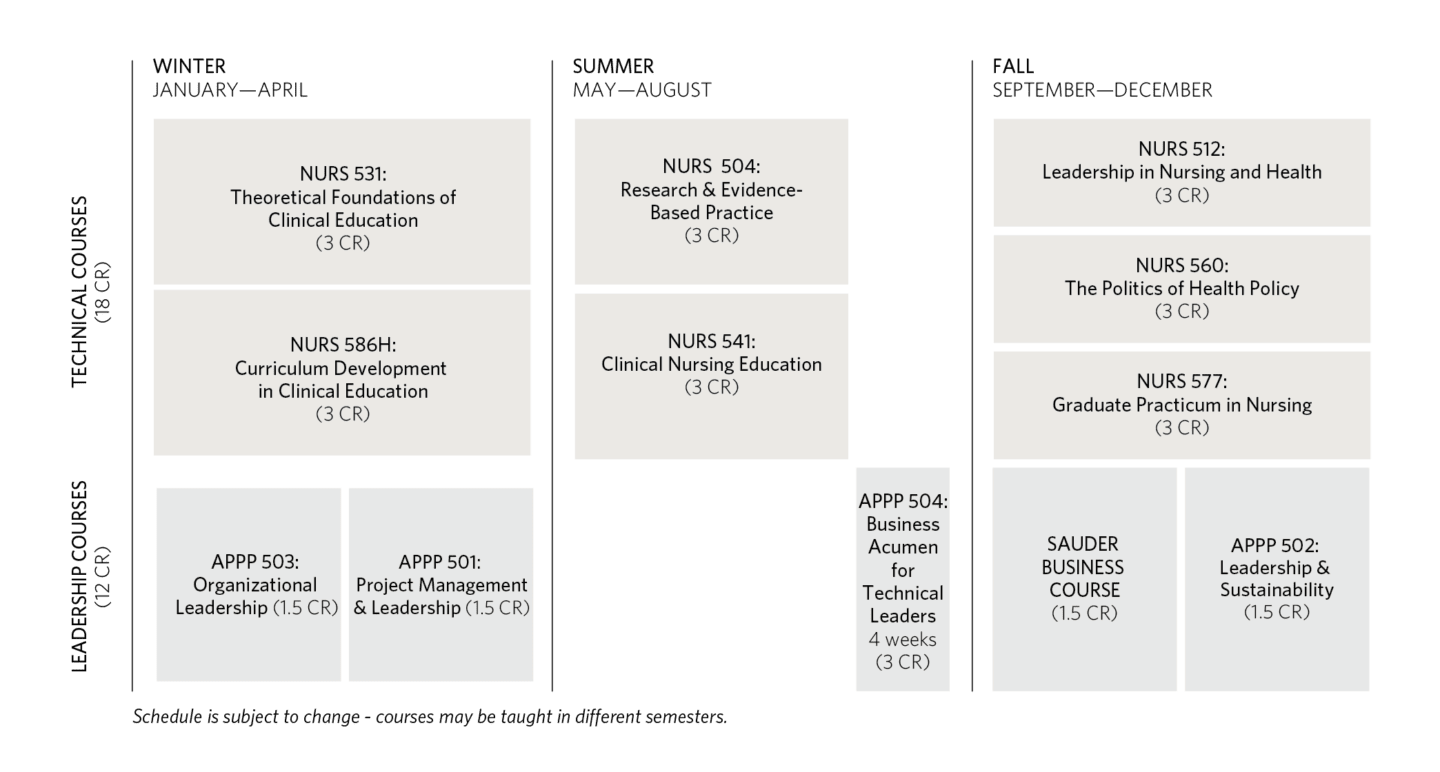
Course Information
The Master of Health Leadership and Policy (MHLP) in Clinical Education represents an innovative leap in professional health care education. With a curriculum comprising 60% health care-focused courses provided by the UBC School of Nursing and 40% business courses from UBC Sauder’s Robert H. Lee Graduate School, this program offers a balanced and comprehensive educational experience.
Our dynamic teaching approach often utilizes the flipped classroom model. Prior to class, you will independently engage with the material through assigned readings and lecture videos. This preparation allows classroom time to be a platform for active learning—here, you’ll dive into discussions, apply your knowledge to real-world case studies, collaborate on group projects, and participate in hands-on demonstrations. This interactive format ensures a deeper understanding and a more practical, hands-on experience with the subject matter.
Course Overview

Part-Time Study Class Schedule
While there is some flexibility, if you’re completing the MHLP in Clinical Education part time over 24 months, you’ll generally take your business classes and two health-care courses in the first 12-month period. In the second year of the program, you’ll typically focus on your health-care classes. Over the two years of part-time study, you’ll attend classes alongside both full-time and part-time students, giving you enhanced opportunities to build your professional network.
Winter term: January to April
NURS 531: Theoretical Foundations of Clinical Education
This course focuses on the theoretical foundations of clinical education and explores beliefs, values, philosophies and theories that underlie education within a wide array of clinical practice contexts. You will gain knowledge of different domains of knowledge relevant to clinical practice and identify strategies to foster learning in different domains. You will be challenged to critically analyze the implications of the “theory-practice” gaps and develop a repertoire of strategies to apply theory in a range of simple to complex clinical educational contexts.
By the end of this course, students will be able to:
- Articulate a philosophy of clinical education that aligns with the principles and theoretical underpinnings of health care professional education.
- Identify the different domains of knowledge relevant to clinical practice and propose strategies to foster learning in different contexts.
- Analyze the implications of the ‘theory-practice gaps’ in select practice contexts.
- Develop a repertoire of strategies to apply theory across a range of clinical education contexts.
NURS 586H: Curriculum Development in Clinical Education
This course takes participants on a curriculum ’journey’ wherein they will apply theoretical concepts and principles to an actual design of a curriculum. The course will follow an iterative, emergent process – similar to curricula development, based on learning needs and goals of the class. Structured seminars will focus on key elements, issues and challenges at the core of curriculum development, and then participants will work as a curriculum committee to enact the curriculum process in a relevant, hypothetical context of their choice (e.g. a post-secondary educational institution, a professional development program within a health care agency, or a client education program for an identified population.
By the end of this course, students will be able to:
- Apply concepts and principles from curriculum theory to the development of curricula in specific contexts.
- Identify and discuss relevant contextual factors and their impact on curriculum and curricula design/development.
- Engage in the process of goal-setting, curriculum design.
- Project relevant considerations for program evaluation.
- Identify critical faculty development issues and their relevance at selected phases of curriculum development.
APPP 503: Organizational Leadership
Understand the behaviour of people and groups and how this applies to management and leadership within professional organizations. This course explores motivation, group dynamics, organizational structure, leadership styles and tools for assessing organizational effectiveness. The course is collaboratively delivered with the Faculty of Commerce and Business Administration.
By the end of this course, students will be able to:
- Apply theoretical principles of leadership and organization behaviour in a variety of organizational contexts and industries.
- Diagnose organizational behaviour and people management challenges and find solutions that deliver business results and ensure employee engagement.
- Understand what it takes to build effective manager-employee relationships, given the realities of power, motivation and commitment in an organizational setting.
- Develop and present recommendations for organizational leadership challenges using the case study analysis approach.
APPP 501: Project Management & Leadership
Develop skills for leading complex multidisciplinary projects by using management processes that include: project management frameworks, standards, planning, scheduling and estimating, communication and risk management. Case studies in industry-relevant project management will be incorporated into the course. This course is collaboratively delivered with the Faculty of Commerce and Business Administration
By the end of this course, students will be able to:
- Define project management and compare common project frameworks.
- Evaluate project management processes for projects within an organization.
- Describe and apply stakeholder analysis and management.
- Explain the importance of scope definition to project planning.
- Demonstrate use of project planning processes by developing core project plans including schedules, budgets, risk matrices and communication management.
- Demonstrate use of project managing processes including change control.
- Examine factors that contribute to project success and failure.
- Assess impact of team leadership on the success of projects.
Summer term: May to August
NURS 504: Research & Evidence-Based Practice
The purpose of this course is to build foundational knowledge and skills in searching the literature, critically analyzing research and synthesizing evidence, and applying this evidence to issues of relevance to nursing practice.
By the end of this course, students will be able to:
- Describe the nature of evidence and its contribution to knowledge development in nursing.
- Identify research that is relevant to a particular problem or topic area in nursing.
- Systematically assess and evaluate the quality of this research and the usefulness of the evidence it provides.
- Synthesize and interpret this evidence to develop justifiable conclusions and identify knowledge gaps.
- Apply strategies for using this evidence to address specific nursing practice goals and issues.
NURS 541: Clinical Nursing Education
The course is designed to provide a theoretical foundation for graduate students to develop, or to enhance their knowledge and skills as clinical educators of nursing staff or students. The purpose of this course is to give students an opportunity to learn and reflect upon the scope of clinical educator role. In addition, it will provide students an opportunity to explore their future plans in relation to their professional development as clinical educators. This course explores strategies that can be used to foster a learning community, critical thinking, reflection, active learning, learner confidence, and development of teaching skills. To this end, issues such as teacher-student-staff-client relationships, diversity among learners, ethics, and the development of professional values are explored. Participants in this course are expected to explore the theoretical and research literature and apply this body of knowledge to their particular areas of interest in clinical teaching.
By the end of this course, students will be able to:
- Understand theories and models of learning and teaching as they apply to clinical nursing education.
- Appreciate the complexity of the learner-educator relationship and the context of clinical education.
- Use a variety of teaching strategies to enhance learning in the clinical setting.
- Examine methods of assessment and evaluation in clinical nursing education.
- Explore selected issues embedded in clinical nursing education.
- Critique evidence-based literature that has relevance for clinical nursing education.
APPP 504: Business Acumen for Technical Leaders
An asset to the aspiring technical leader, business acumen is knowing how business works and applying that knowledge with the goal of business improvement. This course offers an elevated perspective of how technical skills contribute to building value in a business. The course immerses aspiring technical leaders in the practical application of core business skills and the development of six core business competencies, which are presented as modules: Managerial Accounting, Strategy and Performance, Market Evaluation, Operations Management, Negotiations and Contract Management and Business-Case Building and Valuation. This course is collaboratively delivered with the Faculty of Commerce and Business Administration.
By the end of this course, students will be able to:
- Apply theoretical principles of business in a variety of contexts.
- Analyze and discuss common business situations encountered by managers from multiple angles using the case study analysis approach.
- Appreciate the importance of each of the functional areas, as well as the inter-connectedness of business decision-making.
- Appreciate the importance of excellent written and oral communication skills.
- Understand the importance of effective team work and strong ethical standards in management.
- Plan and present effective and meaningful presentations.
Fall term: September to December
NURS 512: Leadership in Nursing and Health
This online course is designed to introduce students’ to contemporary leadership theories and practices in the context of complex, constantly changing health care environments. Key leadership competencies will be highlighted throughout the course. It is intended that the course will enhance students’ leadership potential and prepare them as an emerging leader in various practice environments. The course is offered in an online format to allow time in students’ schedules for their practicum experience.
By the end of this course, students will be able to:
- Explore an array of leadership theories and concepts.
- Critically evaluate the applicability of selected theories and concepts to nursing leadership.
- Examine the individual, interpersonal, historical, and structural contexts in which nursing leadership is enacted.
- Identify and discuss factors within the preceding contexts that influence leadership.
- Examine current evidence-informed competencies for effective nursing leadership at all levels of practice (e.g., front-line care provider, middle-level nurse leadership, executive nurse leadership).
- Examine the contextual resources and constraints for effective nursing leadership at all levels of practice.
- Explore the current challenges facing nurse leaders at levels of leadership practice (e.g., bullying, changing scope of practice, RN/LPN teamwork).
NURS 560: The Politics of Health Policy
This course is the study of the processes and strategies influencing health and social policy, and the social and political contexts in which policy is created.
By the end of this course, students will be able to:
- Critically examine the different theoretical and ideological perspectives from which policy is conceptualized.
- Analyze the social, political and economic contexts in which policy is created and enacted.
- Interpret health and social policy processes in the context of larger social trends and political mandates.
- Examine how policies differentially affect particular populations and shape health and social inequities.
- Identify new directions needed in health and social policy development.
- Critically examine how nurses and other health professionals can influence policy development and implementation.
NURS 577: Graduate Practicum in Nursing
This practicum-based course is designed to provide the student with an opportunity to explore advanced practice in the field of education through a selected educational setting of interest. Through the practicum experience the student is expected to engage reflexively to explore the relationship between nursing and education knowledge and educational practice in a specific teaching setting.
By the end of this course, students will be able to:
- Demonstrate and apply knowledge of relevant concepts, theories, and research findings.
- Develop expertise in the practical application of theories and concepts pertinent to selected focus area.
- Use critical thinking skills.
- Demonstrate abilities to work independently and collaboratively.
- Effectively complete goal stipulated in the learning contract with faculty supervisor.
UBC Sauder School of Business Courses
Students can choose a UBC Sauder Business Course to gain greater exposure to a particular area of interest. Options include (subject to change):
BASC 550: Operations and Logistics
This course will introduce students to the key concepts and tools needed to understand and effectively manage supply chains and business operations in general. A key concept in this course is the “business process”, and managing and improving such processes.
BAMA 519: Building Brand with Purpose
This course explores the core principles of branding within the context of social and environmental responsibility including healthcare, sustainability and human rights. Fundamental marketing strategies are reinforced as they relate specifically to: 1) non-profits, 2) social marketing designed to change society’s behaviour and 3) cause-related-marketing within the corporate sector.
BA 563: Decision Making for Managers
This course is designed to make you a better decision maker by helping you understand your weaknesses and build on your strengths in decision-making. This is an integrative course that links material from Economics, Operations, Statistics, Marketing, Psychology, Finance, and Strategy.
*Course offering subject to change.
BAEN 580B: Special Topics in Business: Creative Destruction Lab
The Creative Destruction Lab Venture Program is a 3-credit course in entrepreneurship in which students will work with the Creative Destruction Lab West (CDL-West) team to help emerging technology and science focused start-ups. Students will become familiar with the CDL-West companies and will have the opportunity to support with market analysis, customer development, financial analysis, and other core activities related to building early stage start-ups. Students will be provided with visibility into how venture capitalists and angel investors make investment decisions.
BAMA 505-001: Business Development
This course uses the Business Development = Sales = Essential skill for business people = everyone today is in the business of selling thinking. This course is focused on the learning of foundational skills with the intention of enabling students to create better and more successful selling encounters in whatever career they pursue
APPP 502: Sustainability & Leadership
This course helps students build skills to lead change that influences the triple bottom line and explores concepts related to sustainability, change agency systems thinking, awareness and perspective for engagement and communication, adaptive leadership and change dynamics. It also incorporates case studies in organizational and social change. This course is collaboratively delivered with the Faculty of Commerce and Business Administration.
By the end of this course, students will be able to:
- Recognize tools, concepts, standards and frameworks used in sustainable business.
- Analyze current realities, market opportunities and issues related to sustainability across a range of industries.
- Integrate sustainability-related concepts into their own industry and/or personal experiences.
- Synthesize, apply and communicate sustainability knowledge to one’s peers.
- Apply various leadership concepts and tools into their professional practice, and in particular to sustainability-related initiatives.
Application Deadlines
The online application portal for the January 2025 intake is now open!
Applications are due June 25, 2024.
How to ApplyJoin us for an
Info Session
Sign up for our latest online information sessions and discover what our programs have to offer.
Sign Up NowApplicant Guide
Navigate the application process with ease!
Sign up to receive tailored instructions and a detailed guide directly to your email.
Sign upFeatured Faculty and Staff


